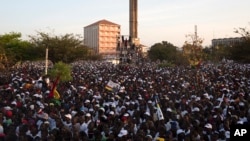DAKAR —
Guinea-Bissau voters head to the polls Sunday to pick between two candidates in a run-off election aimed at returning the country to constitutional rule two years after a military coup.
In a nation repeatedly beset by coups, mutinies and assassinations since winning independence from Portugal in 1974, stability has topped the campaign-season agenda.
Unlike Guinea-Bissau's attempted 2012 presidential election, in which the military intervened when it appeared that Carlos Gomes Junior, an ex-prime minister and ruling PAIGC party candidate, was going to beat Kumba Yala, a pro-military ex-president, this year's electoral process has been calm.
With new faces on the ballot, some voters are optimistic as candidates hold their final campaign rallies on Friday.
"I hope ... there won't be any more coups, that there will be peace and unity because that is what will develop the country," said student Gabriela Nanque.
But some analysts warn that underlying dynamics remain similar to the previous election.
PAIGC candidate Jose Mario Vaz, for example, is seen as holding a strong position against opponent Nuno Gomes Nabiam, the military's preferred 2014 candidate.
PAIGC won a parliamentary majority in this year's first round voting, which Vaz, a former finance minister who also served as mayor of the capital, Bissau, led with 41 percent of the vote.
"We need to get rid of hatred and jealousy. We need to turn the page for this country," Vaz announced to a campaign rally on Thursday, during which he pledged stability. "We need to unite and reconcile to rebuild the country. We need to put the past behind us and that is what you will be doing by voting for me."
His opponent, Nabiam, former head of the civil aviation authority, nabbed 25 percent of the first-round votes.
Nabiam supporter Buo Manuel says a win for his candidate is a win for Guinea-Bissau.
"Nabiam wasn't in past governments, so he doesn't have those bad habits that hindered the development of the country," he said.
Both candidates have pledged to respect the results.
The first round April 13 election saw a record voter turnout of about 80 percent.
Lassana Cassama contributed to this report from Bissau.
In a nation repeatedly beset by coups, mutinies and assassinations since winning independence from Portugal in 1974, stability has topped the campaign-season agenda.
Unlike Guinea-Bissau's attempted 2012 presidential election, in which the military intervened when it appeared that Carlos Gomes Junior, an ex-prime minister and ruling PAIGC party candidate, was going to beat Kumba Yala, a pro-military ex-president, this year's electoral process has been calm.
With new faces on the ballot, some voters are optimistic as candidates hold their final campaign rallies on Friday.
"I hope ... there won't be any more coups, that there will be peace and unity because that is what will develop the country," said student Gabriela Nanque.
But some analysts warn that underlying dynamics remain similar to the previous election.
PAIGC candidate Jose Mario Vaz, for example, is seen as holding a strong position against opponent Nuno Gomes Nabiam, the military's preferred 2014 candidate.
PAIGC won a parliamentary majority in this year's first round voting, which Vaz, a former finance minister who also served as mayor of the capital, Bissau, led with 41 percent of the vote.
"We need to get rid of hatred and jealousy. We need to turn the page for this country," Vaz announced to a campaign rally on Thursday, during which he pledged stability. "We need to unite and reconcile to rebuild the country. We need to put the past behind us and that is what you will be doing by voting for me."
His opponent, Nabiam, former head of the civil aviation authority, nabbed 25 percent of the first-round votes.
Nabiam supporter Buo Manuel says a win for his candidate is a win for Guinea-Bissau.
"Nabiam wasn't in past governments, so he doesn't have those bad habits that hindered the development of the country," he said.
Both candidates have pledged to respect the results.
The first round April 13 election saw a record voter turnout of about 80 percent.
Lassana Cassama contributed to this report from Bissau.




